The Zoe Zone
Zoe loves books, writes horror, erotica and erotic romance, and can be found as close to the stage as possible at small clubs across the Southeastern U.S., rocking the fuck out to her favorite bands.
Under the name Holden Wells, she has published several short stories in gay erotica anthologies. One of these—Roughing It—has been revised and expanded into a novella and is now available in print and ebook format. The sequel to Roughing It will be coming out in 2014. A number of short stories featuring the same characters are also in the works, the first of which, "Ain't Talkin' 'Bout Love," was released in ebook format in October 2013.
Zoe has also written a novel and a long story (both erotic romance) as Zoe X. Rider, both of which are currently seeking publication. In the meantime, she is working on a couple horror novels and a sequel to the erotic romance novel.
Currently reading
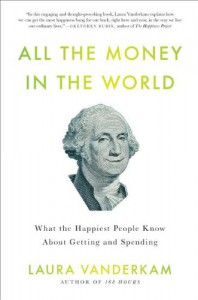 Great premise. Maybe someone less completely oblivious will write a useful book on the subject one day.
Great premise. Maybe someone less completely oblivious will write a useful book on the subject one day.Here's the premise:
1. Become mindful of what you're doing with your money (and of what you can't do because of other choices you're making)
2. Question your assumptions about spending, saving and earning
3. Determine what you (not society, your peers, expert marketers or your mother) value--what's brought you happiness, what's brought you regret or stress? What do the decision you've made say about your financial values?
4. Make financial decisions accordingly.
I also like how the book emphasizes that penny-pinching and sacrificing (staunching the flow of money going out, in other words) aren't the only ways (or necessarily the most effective ways) to free up more money in your life. Budget cutting is just closer to people's comfort zones than trying to figure out how to increase the amount of money flowing in.
The author, though, I could do without. She's managed to turn an excellent premise into a guide to rationalizing your financial decisions. Do you like lattes? You should have lattes. Definitely. Buying a smaller house is an excellent idea, and here are great reasons why you should consider it--but you if you can rationalize the bigger one like the author did, then go right ahead. Or cars. You can rationalize owning two even if you don't really need two, just ask the author how she did it. (But don't raise chickens. Or forage. The author does not value these activities, and you shouldn't either. Or something.).
If you're in the author's demographic (young, educated, upper middle class, work-from-home female blogger), you'll probably get along with her just fine. If not, you might still get something out of the book...but if you also get an urge to kick the author in the teeth a time or two, too, well...I know where you're coming from.
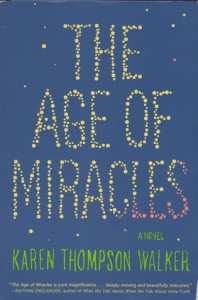 The earth's rotation has suddenly started to slow. Each day brings a longer day. Yet life goes on.
The earth's rotation has suddenly started to slow. Each day brings a longer day. Yet life goes on. Like Jack Womack's Random Acts of Senseless Violence and Jean Hegland's Into the Forest, "The Age of Miracles" is told from the point of view of a young girl--in this case 11/12-year-old Julia. Despite the age of the narrator, I wouldn't quite call "The Age of Miracles" young adult (and even less so "Random Acts" or "Into the Forest"--especially "Random Acts").
"The Age of Miracles" differs from typical post-apocalyptic YA in that Julia doesn't kick any ass. She doesn't save anyone, she's not a Heroine: she's just a regular kid, a girl with a painful crush on a neighborhood boy, an only child whose best friend up and decided to be best friends with someone else, a sixth-grader with an anxious mother and an imperfect father.
She's lonely and trying to find her way through a regular life under increasingly irregular circumstances--just like everyone else on the steadily slowing planet.
The Hunger Games, Pure, Uglies--those books are fun reads--but what I really love are "the world as we know it is coming to an end, yet life goes on" stories, like "The Age of Miracles," "Random Acts of Senseless Violence" and "Into the Forest."
I read "The Age of Miracles" compulsively, eager to find out what became of both the world and Julia. The writing was wonderful. The end was...what it had to be. I look forward to Karen Thompson Walker's future books.
 I was really pretty sure as I started reading this book that I wasn't going to continue reading this book. The first few chapters were pages of unlikeable characters doing unlikeable things--and Jorg was the worst of it. What a giant jerkoff.
I was really pretty sure as I started reading this book that I wasn't going to continue reading this book. The first few chapters were pages of unlikeable characters doing unlikeable things--and Jorg was the worst of it. What a giant jerkoff. At some point--I'm not sure where exactly, but early enough in my reading to catch me before I set the book aside and moved onto something more promising--Jorg crept under my skin. And Makin Bortha. And the Nuban.
After the first few chapters, the book got its hooks in me. The read made for a very enjoyable weekend. There was a reason for everything, nothing was necessarily as it first appeared, and the characters--as well as the story--were more complex and interesting than I'd expected from the opening. I even bounced with glee once or twice as the story went along.
King of Thorns is officially on my to-acquire list. I have my fingers crossed that Mark Lawrence (and Jorg) can pull off the magic twice.
In the meantime, I've been recommending it to select friends, the ones most likely to appreciate such a dark and twisted story.
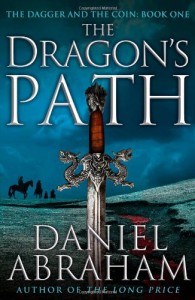 I was restless reading this one, my mind constantly wandering to other books on my to-read list and wondering if I wouldn't be enjoying myself more if I'd picked one of those instead.
I was restless reading this one, my mind constantly wandering to other books on my to-read list and wondering if I wouldn't be enjoying myself more if I'd picked one of those instead. Being incessantly reminded of the tragic yet clichéd loss that one of the characters suffered didn't help. (Turning it into a drinking game might have. Keep that in mind if you find it bothers you, too.)
Tripping over the writing here and there didn't help either.
Nor did the fact that I really didn't enjoy spending time with one of the POV characters, or that I had trouble buying that poetry was a manly endeavor but an interest in speculative essays marked you as a dweeb.
There was enough in there, though, to keep me with it to the end, at which point I struck it from my Kindle and dove straight into one of the other books calling for my attention.
Except..in idle moments I would realize I was turning the characters over in my head, wondering what they were doing, how they were getting along, what would become of them. I'd find myself thinking about how Daniel Abraham handled certain things, the choices he made. How a lesser author would have done what you might expect, but Abraham instead took these opportunities to make his characters more complex and human, even the one I didn't (still don't, won't ever and don't have to) like.
Of those books I wanted to be reading instead, one I set aside unfinished (likely for good). The other two were fun--lots of action and adventure--but the characters didn't make themselves a home in my head the way the players in The Dragon's Path did.
Last night I finished book 2, which was wonderful.
What I wouldn't give for book 3 to be available already.
 Started out not too badly, then around halfway through the story stalled, and I began to care less and less about the characters, and the story continued to flounder...eventually I gave myself permission to go read something else.
Started out not too badly, then around halfway through the story stalled, and I began to care less and less about the characters, and the story continued to flounder...eventually I gave myself permission to go read something else.
 I picked up the book because I'd heard good things about it from people whose opinions I trust. If I'd just come across the book at a store, though, I'd have walked right by it. The cover is misleading, making the book look like juvenile fiction--Harry Potter in a police uniform, perhaps--which it's not.
I picked up the book because I'd heard good things about it from people whose opinions I trust. If I'd just come across the book at a store, though, I'd have walked right by it. The cover is misleading, making the book look like juvenile fiction--Harry Potter in a police uniform, perhaps--which it's not. It's also not, per se, a ghost story, though ghosts are in it. It's not a police procedural. It's about people and lives and living, and it's extremely well done. I was engrossed in it, and now I'm a little sad that it's over and I won't be riding along with Mercer, Jude, Toronto and Fiona anymore.
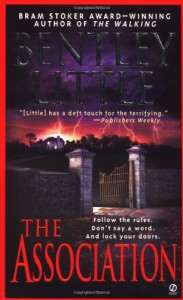 A fast read. On the whole pretty good entertainment. In what's typical of genre, the characters serve the plot, even when it means that they do (or don't do) things that don't quite fit how they've otherwise presented themselves. Still, I got my money's worth out of the book.
A fast read. On the whole pretty good entertainment. In what's typical of genre, the characters serve the plot, even when it means that they do (or don't do) things that don't quite fit how they've otherwise presented themselves. Still, I got my money's worth out of the book.
 I enjoyed this a lot more than "The Woods Are Dark," but there's a lot of stuff thrown in here specifically to either slow down the pace or notch up the tension...and these things either fizzle out or go completely unexplained.
I enjoyed this a lot more than "The Woods Are Dark," but there's a lot of stuff thrown in here specifically to either slow down the pace or notch up the tension...and these things either fizzle out or go completely unexplained.
 This thin novel is the first in a series about Victor, a man who became a vampire shortly after Jesus' resurrection and who has now, 2000 years later, found someone who might take Jesus's place in his fevered brain.
This thin novel is the first in a series about Victor, a man who became a vampire shortly after Jesus' resurrection and who has now, 2000 years later, found someone who might take Jesus's place in his fevered brain. The main character is unlikable. He's learned nothing in 2000 years--nor has he by the end of this book. Also, some of Schiefelbein's vampire myth makes no sense. But it's a fairly quick read, and if you're in the mood for blood and violence and non-consensual gay sex, this might hit the spot for you.
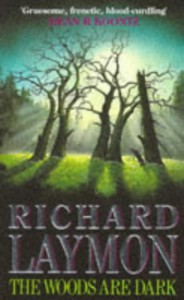 A decent, fast read. My only complaint is that some (not all, but some) of the sexual stuff hits a wrong note. Two women encounter a grotesque legless thing that throws a severed hand at them, for instance, and a page (and not that many minutes) later, one of the women is distracted by the feel of her shirt pulling taut over her nipples when she stretches. Um...? Not what I'd be thinking about at that point!
A decent, fast read. My only complaint is that some (not all, but some) of the sexual stuff hits a wrong note. Two women encounter a grotesque legless thing that throws a severed hand at them, for instance, and a page (and not that many minutes) later, one of the women is distracted by the feel of her shirt pulling taut over her nipples when she stretches. Um...? Not what I'd be thinking about at that point!
 Fantastic cover, intriguing premise, average writing, villains too over the top for my taste.
Fantastic cover, intriguing premise, average writing, villains too over the top for my taste.What I liked (besides the cover art, which is what got me to the cash register with this book in the first place): Gord Rollo wasn't afraid to raise the stakes against the protagonist. Think of the most vulnerable position imaginable for a character to be in and you probably haven't come close to imagining Mike's predicament.
What I didn't like: Oh man I wish the villains had been drawn more subtly. They're nothing more than caricatures here, acting just to serve plot and raise eyebrows. This would have been an incredible book if the antagonists had been handled more deftly. As it stands it's just your average pulp horror novel.
 Read this on Reesa's recommendation and spent an enjoyable few days doing so. The voice is charming, and I found the book to be leisurely without being slow; I got to get good and comfy in the story world. The only two unfavorable things I have to say are 1) Nicholas Brisbane--ugh and 2) the mystery's resolution strained my willingness to suspend disbelief a little. Great supporting characters, though, and like I said: charming.
Read this on Reesa's recommendation and spent an enjoyable few days doing so. The voice is charming, and I found the book to be leisurely without being slow; I got to get good and comfy in the story world. The only two unfavorable things I have to say are 1) Nicholas Brisbane--ugh and 2) the mystery's resolution strained my willingness to suspend disbelief a little. Great supporting characters, though, and like I said: charming.
 I enjoyed this book much more than I was expecting to. Certainly, I was hoping to enjoy it--wouldn't have bought it otherwise--but the reviews on Amazon had me wondering if I would. I have a feeling it'll be one of those books I'll be thinking about long after I've read it.
I enjoyed this book much more than I was expecting to. Certainly, I was hoping to enjoy it--wouldn't have bought it otherwise--but the reviews on Amazon had me wondering if I would. I have a feeling it'll be one of those books I'll be thinking about long after I've read it.
 After reading the excerpt and seeing the 48 5-star reviews on Amazon, I was excited to get this book and start in on it. The opening is vivid and visceral--it's the excerpt I read. (The jacket copy is likewise excellent, by the way.) Beyond the opening, there are some engaging scenes--family stuff involving the main character (Douglas), his dad, and his little brother, and sometimes friend-of-the-family Jack. In between and around those scenes was a lot of stuff that made me roll my eyes, or wish that it had been handled more...deftly. The author had to set up some special things about the main character, but they went over like lead balloons with me. And then the five pages of Jack explaining quantum physics to Douglas....
After reading the excerpt and seeing the 48 5-star reviews on Amazon, I was excited to get this book and start in on it. The opening is vivid and visceral--it's the excerpt I read. (The jacket copy is likewise excellent, by the way.) Beyond the opening, there are some engaging scenes--family stuff involving the main character (Douglas), his dad, and his little brother, and sometimes friend-of-the-family Jack. In between and around those scenes was a lot of stuff that made me roll my eyes, or wish that it had been handled more...deftly. The author had to set up some special things about the main character, but they went over like lead balloons with me. And then the five pages of Jack explaining quantum physics to Douglas.... And, you know, some of the writing is just really, really good--but it's offset by really, really flat stuff like this:
As we drove down my street, something seemed out of order. Even in the dark I could see several unfamiliar vehicles parked in front of our house, one of which was a police car.
I recently read a blog post by Matthew Cheney in which Cheney was trying to pinpoint what it is that bothers him about many contemporary novels these days. Here are some of the highlights from his post and the comments to it:
"too much...intrusive analysis"
"my brain isn't being engaged enough"
"the abstraction sends my readerly brain down paths it finds dull and vacant"
"The details in stories seem to be presented too clearly, too obviously"
"Background information that should be made important through implication, not assertion."
"every time I pick [up Dan Simmmons' THE TERROR] and try to read the first page, I feel as if he's just telling me all there is to know, leaving no room for inference or any sense of richness beyond the bare words"
"part of it might be the sense that the 'author' (as in the outside agency and not merely the story writer) is too visible in the text, almost as if the gears were seen poking through a windup toy, ruining the simulacrum of a 'live' story"
"distracted from the story itself by the explanatory intrusions and other various small niggling bits that don't permit me to forget "that little man behind the curtain"
(The full blog post is here)
I quote these because they so well describe my experience with DISCIPLINE.
And what frustrates me most is that, judging from the bits that do work, Paco Ahlgren had the potential to make this a fantastic book. Missed potential gets under my skin like nothing else.
Maybe he'll hit closer to his potential with his next book. Unfortunately, if it's a sequel to DISCIPLINE (one of the Amazon reviews mentioned he was working on one), I'll have to take an automatic pass on it.









